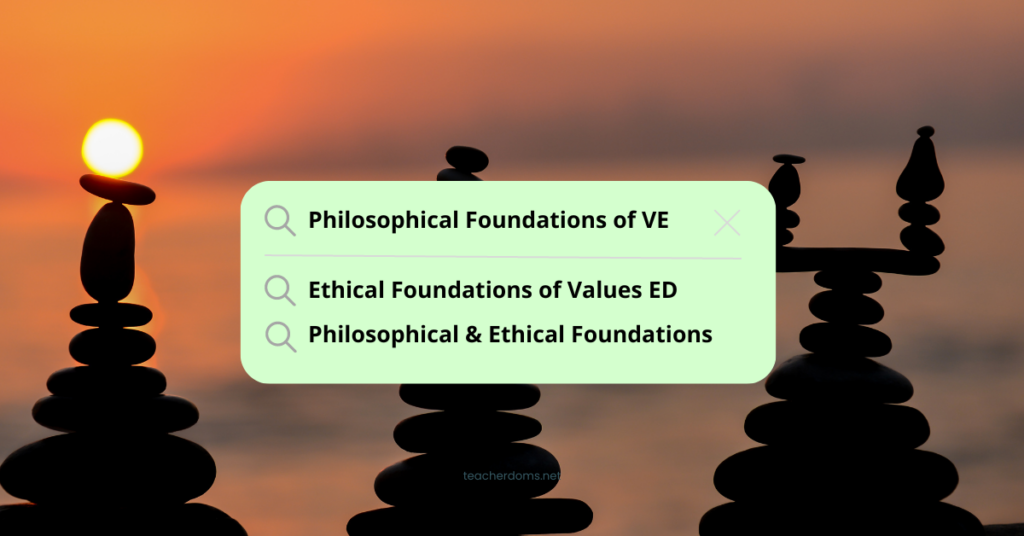
Philosophical and Ethical Foundations of Values Education: Intro
This article briefly introduces the course Philosophical and Ethical Foundations of Values Education. In this course, we will learn the Philosophies and frameworks that are commonly used as foundations for values education; the nature of the human person; the definition and description of values, morality, and human dignity.
This course, Philosophical and Ethical Foundations of Values Education, has 7 modules and 24 informative lessons. Below are the modules included in this course.
- Module 1: Introduction.
- Module 2: Philosophies of Man.
- Module 3: Nature of the Human Person.
- Module 4: Meaning of Values
- Module 5: Meaning, Nature, Purpose, & Norms of Morality
- Module 6: Dignity of Human Life
- Module 7: Drills
Let`s begin with this brief introduction.
This is Module 1, a brief introduction to this course. Let`s answer this:
Philosophy is the science of all things through the use of ________________ .
- A. Intellect and will
- B. Faith and reason
- C. Reason alone
- D. Internal senses and passion
What is your answer, teacher?
The correct answer is option C. Why? Let`s find out.
Philosophy literally means love of wisdom. It is a science whose essence is founded on reason, experience, reflection, intuition, meditation, imagination, and speculation. It leads to CRITICAL THINKING which embraces questioning, analyzing, criticizing, synthesizing, evaluating, and judging a given phenomenon of reality.
Looking at these mental operations, or cognitive activities, we can say that philosophy is indeed the science of all things through the use of reason alone. Option B is already going beyond philosophy because of the use of faith. Fides et ratio or faith and reason are tools used in theology (the study of God). That is the reason why we say philosophy is the handmaid of theology. And since plenty of terms in theology are borrowed from philosophy, it is essential to learn philosophy in order to go deeper in our study of theology.
Philosophy, which is the study of all things, has many branches, and the 7 major branches are the following:
- Metaphysics studies the fundamental nature of reality (those beyond physics like the transcendental: truth, goodness, beauty, and oneness).
- Epistemology studies the nature, origin, and limits of human knowledge.
- Ethics is the study of what is right and wrong in human behavior.
- Logic is the study of correct reasoning and argument.
- Politics or political philosophy is the study of government and the relationship of individuals (or families and clans) to communities including the state. It includes questions about justice, law, property, and the rights and obligations of the citizen.
- Aesthetics is the “critical reflection on art, culture, and nature.
- Anthropology or the philosophy of the human person.
Next question.
Which best explains the Philosophy of the human person as a discipline of study?
- A. is one’s desire to know who and what man is
- B. investigates into such person’s internal worlds of ideas
- C. deals with the origin, nature, and the reality of the human existence
- D. all of the above
What is your answer, teacher? The correct answer is option D. All of the above.
Philosophy of the Human Person is an endeavor, which is not an end in itself but a means to an end, which is understanding what a human person is. In other words, It is our desire to know who and what man is (ano ba ang tao?).
It deals with the origin of human life, the nature of the human life, and the reality of the human existence. (Saan ba tayo galing? Saan tayo patungo, at bakit tayo nabubuhay sa mundong ito?) It does not only study the human person but also includes the investigations into such person’s internal worlds of ideas, thoughts and emotions, as well as such person’s social world of inter-subjectivity (ang mas malalim at makabuluhang kahulugan ng pakikipagkapwa-tao).
As a branch of Philosophy, the Philosophy of the Human Person is the context and framework where we discuss the philosophical and ethical foundations of Values Education. Why is that so?
Simply because the object of studying Values Education is the same human person who thinks, chooses, and acts or behaves in a certain manner.
That is why, as a Values Ed major, we have to strengthen and solidify our understanding of the fundamental philosophies behind the Values Education program and curriculum in our country. When we understand those fundamental philosophies, we will not only appreciate the content of our curriculum but can also easily identify the philosophical and ethical underpinning of the lessons we are teaching.
That is the brief introduction, which is basically the definition of the terms: philosophy, and the philosophy of the human person.
Did you learn something from this article? Do you have some clarification? Would you like to share your reflections or realization? Kindly share your thoughts in the comments section below. I will be happy to hear from you!